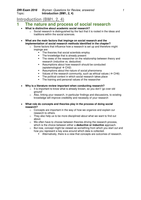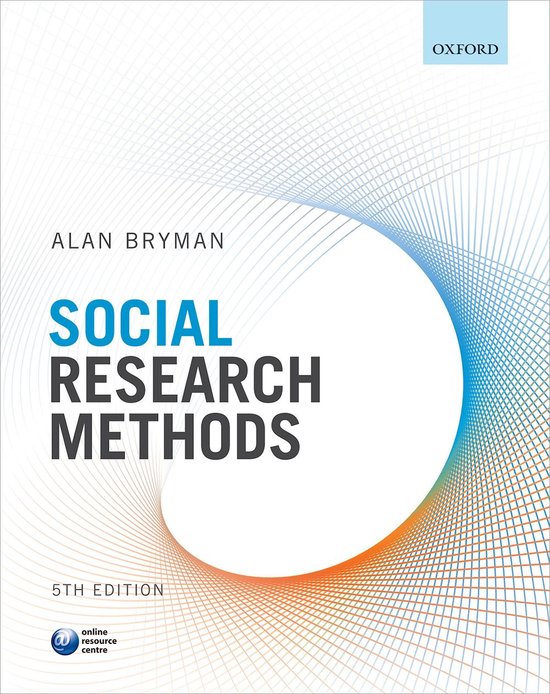DRI Exam 2016 Bryman: Questions for Review, answered 1
Topic: Introduction (BM1, 2, 4)
Introduction (BM1, 2, 4)
1 The nature and process of social research
What is distinctive about academic social research?
o Social research is distinguished by the fact that it is rooted in the ideas and
traditions within the social sciences.
What are the main factors that impinge on social research and the
implementation of social research methods identified in the chapter?
o Some factors that influence how a research is set up and therefore might
impinge are:
The theories that social scientists employ
The knowledge that is already present
The views of the researcher on the relationship between theory and
research (inductive vs. deductive)
Assumptions about how research should be conducted
(epistemological CH2)
Assumptions about the nature of social phenomena
Values of the research community, such as ethical values ( CH6)
The political context in which social research takes place
The training and personal values of the researcher
Why is a literature review important when conducting research?
o It is important to know what is already known, so you don’t ‘go over old
ground’
o Also, linking your research, in particular findings and discussions, to existing
knowledge will improve credibility and necessity of your research
What role do concepts and theories play in the process of doing social
research?
o Concepts are important in the way of how we organize and explain our
research to others.
o They also help us to be more disciplined about what we want to find out
about.
o We often have to choose between theories driving the research process,
which is the choice between either a deductive or inductive approach.
o But now, concept might be viewed as something from which you start out and
how you represent a key area around which data is collected.
Alternatively, there is a view that concepts are outcomes of research.
,DRI Exam 2016 Bryman: Questions for Review, answered 2
Topic: Introduction (BM1, 2, 4)
Why are researchers encouraged to specify their RQ’s? What kinds of RQ’s are
out there?
o If your research question is not specified enough, you might risk having an
unfocused research and you might get into problems when collecting data,
because you might not know what data you actually want to collect.
RQ’s will guide your literature search, guide your decisions about the
design, data coletction and analysis and will determine the direction in
which you have to think.
o The types of research questions:
Describing a phenomenon
Evaluating a phenomenon
Predicting an outcome
Explaning causes and consequences of a phenomenon
Developing good practice (normative)
Comparison
Outline one or two factors that might affect a researcher’s choice of data-
collection instrument
o The kind of information that the researcher wants to find out about
o Whether the researcher wants to use an inductive or deductive approach to
his research
What are the main differences between the data analysed by Zimdars et al. and
Jones et al.
o Zimdars had his data ready in the sense that he got the results from the
questionnaire itself; Jones had to listen back to the audio interviews and
transcribe them
How might you structure the report of the findings of a project that you
conducted?
o Introduction, with the research area, its significance, the RQ and the
hypothesis
o Literature review
o Research methods, including sampling, data collection and analysis
o Results
o Discussion, of the findings in relation to the implications for literature
o Conclusion, the significance is reinforced
If research doesn’t always go according to plan, why should we bother with
methodological principles at all?
o Research often goes well
o And what we read in research reports are mostly accounts that are tidied up
and mostly standard methodological terminology is used, so we must know
what this terminology consists of
, DRI Exam 2016 Bryman: Questions for Review, answered 3
Topic: Introduction (BM1, 2, 4)
2 Social research strategies
What factors would influence your choice for picking a topic in social
research?
o Social research is often motivated by a concern about a pressing social
problem.
o Research I also performed on a topic when a certain opportunity arises to
research that topic.
o A stimulus for research can emerge out of personal experiences.
Outline the difference between grand and middle-range theory.
o A theory is an explanation of observed regularities.
o Grand theories operate on a very abstract and general level, thus it is hard for
a researcher to link a grand theory with the real world.
o Middle-range theories are operating more in a limited domain and vary in their
application, but in general fall somewhere in-between grand theories and
empirical findings.
They attempt to understand and explain a limited aspect of social life
and thus are more likely to be mentioned in social research.
What are the differences between inductive and deductive theory and why is
this distinction important?
o Most common is the deductive view. Based on what is theoretically known
already, the researcher formulates a hypothesis that is then subjected to
empirical research.
o The inductive view is applied when a researcher infers implications of his or
her findings for the theory
o A strategy is iterative when it involves a weaving back and forth between data
and theory, especially in grounded theory
o The distinction between deductive and inductive is not as clear-cut as
presented, they can be better thought of as tendencies.
o It is useful to think of this distinction (or these tendencies) because that could
say whether a theory is rather a motivation for research, or rather an outcome.
What is meant by each of the following terms: positivism, realism, and
interpretivism?
o They are all epistemological terms, concerning the question what is regarded
acceptable knowledge. Three views on this are:
Positivism, which is in favour of applying quantitative methods (of
natural sciences) to social sciences. It advocates that it is possible to
collect observations in a way that is not influenced by pre-existing
theories. Positivism has both deductive and inductive elements:
Deductive theories should generate hypotheses that can be
tested
Inductive knowledge is gained through gathering of facts
Realism, implying that there is a reality separate from our descriptions
of it.
The difference is that positivism is a doctrine on how we should
research and know the world, while realism actually tries to
state how the world is.
Interpretivism subsumes the views of social scientists that think that
social sciences are inherently different from natural sciences. They
don’t only want to explain human behaviour, but also understand
human action hermeneutics.
It values the subjective meaning of social actions.






